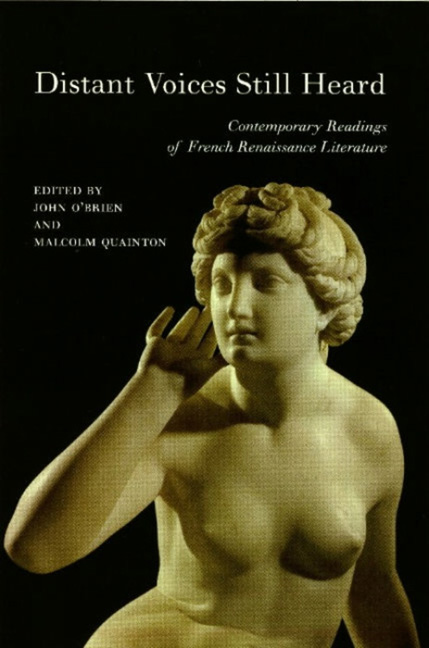Book contents
- Frontmatter
- Contents
- Editors’ Foreword
- Introduction: The Time of Theory
- 1 The Highs and Lows of Structuralist Reading: Rabelais, Pantagruel, chapters 10—13
- 2 Rabelais’ Strength and the Pitfalls of Methodology: Tiers Livre, chapters 7–18
- 3 ‘Blond chef, grande conqueste’: Feminist Theories of the Gaze, the blason anatomique and Louise Labé's Sonnet 6
- 4 Louise Labé's Feminist Poetics
- 5 Reading and Writing in the Tenth Story of the Heptaméron
- 6 Fetishism and Storytelling in Nouvelle 57 of Marguerite de Navarre's Heptaméron
- 7 Creative Choreography: Intertextual Dancing in Ronsard's Sonnets pour Hélène: II, 30
- 8 An Overshadowed Valediction: Ronsard's Dedicatory Epistle to Villeroy
- 9 ‘De l'amitié’ (Essais 1.28): ‘Luy’ and ‘Moy’
- 10 Montaigne's Death Sentences: Narrative and Subjectivity in ‘De la diversion’ (Essais 3.4)
- Select Bibliography
- Index
Editors’ Foreword
- Frontmatter
- Contents
- Editors’ Foreword
- Introduction: The Time of Theory
- 1 The Highs and Lows of Structuralist Reading: Rabelais, Pantagruel, chapters 10—13
- 2 Rabelais’ Strength and the Pitfalls of Methodology: Tiers Livre, chapters 7–18
- 3 ‘Blond chef, grande conqueste’: Feminist Theories of the Gaze, the blason anatomique and Louise Labé's Sonnet 6
- 4 Louise Labé's Feminist Poetics
- 5 Reading and Writing in the Tenth Story of the Heptaméron
- 6 Fetishism and Storytelling in Nouvelle 57 of Marguerite de Navarre's Heptaméron
- 7 Creative Choreography: Intertextual Dancing in Ronsard's Sonnets pour Hélène: II, 30
- 8 An Overshadowed Valediction: Ronsard's Dedicatory Epistle to Villeroy
- 9 ‘De l'amitié’ (Essais 1.28): ‘Luy’ and ‘Moy’
- 10 Montaigne's Death Sentences: Narrative and Subjectivity in ‘De la diversion’ (Essais 3.4)
- Select Bibliography
- Index
Summary
This book arose from a perceived pedagogical need. It seemed to us that a book was needed which would be of assistance to students as they intensified their study of French Renaissance literature – a book that would attempt to bridge the transitional moment between the specific study of a very limited number of Renaissance texts and the larger demands that are made by more advanced study in Great Britain and abroad. This period of transition will often be the final year of the undergraduate degree and the first year of graduate study. It is moreover at these periods that students frequently encounter in a serious, professional way the theoretical readings that have informed the study of the French Renaissance during the last thirty years or so.
The aim of this present publication is therefore multiple. First and foremost, it seeks to introduce maturing readers to representative interpretations of early-modern French literary culture using the perspectives of contemporary literary theory. The volume proceeds by way of paired worked examples from five Renaissance authors who, we believe, represent a broad chronological span and, we hope, achieve a reasonable balance between prose and poetry. Readings include structuralism, psychoanalysis, and feminism, and they focus on issues such as the problem of interpretation, the role of the reader, the nature of the text and the question of gender. The Introduction supports this enterprise by tracing the development of contemporary critical methodologies of Renaissance literature as a means of situating the readings undertaken in the body of the book. It also addresses broader issues in the interpretation of sixteenth-century literature, such as questions of historical distance and difference.
In a volume of these dimensions, which needs to keep to manageable size, it is not possible to include every strand of literary theoretical thinking about the sixteenth century that has engaged the attention of critics over the past thirty years. We are aware that some readers might wish to see greater space devoted to deconstructive interpretations, to New Historicism, or to recent enquiry into post colonialism.
- Type
- Chapter
- Information
- Distant Voices Still HeardContemporary Readings of French Renaissance Literature, pp. vii - viiiPublisher: Liverpool University PressPrint publication year: 2000



